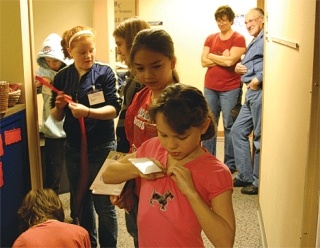The hallway Monday was clogged with anxious employees hanging sale prices and stockpiling goods before the grand opening.
Ducking under the counter, fourth-grader Mara Powers and fifth-grader Molly Vagt met the first thirsty customers. Two Gatorades were sold off in minutes and the girls taped their first earned dollar to the wall.
Close by, assistant managers Ticia Cox and Lexy Cribb monitored the hardworking staff, composed of classmates from the Home Connection School in Oak Harbor.
The HC Student Store was churning through its first morning.
In this real-life business, with revenues and expenses, inventory and cash to monitor, the students do nearly everything. There are store clerks, advertisers, a bookkeeper, stock managers and a personnel manager. Employees are in fourth through eighth-grade.
Teacher River Powers said she hopes students come to learn the inner workings of a business.
“They can learn what being a good employee is about and any early advantage they have is beneficial,” Powers said. “By practicing more, they’ll be ahead of their peers.”
Similar student stores have cropped up on campuses around the U.S., usually beginning with an ambitious business teacher. Experts say hands-on experience rather than book-driven business concepts help students hone collaborative, cooperative and decision-making skills.
Powers’ students will deal with cash, shortages, overages, inventory issues and customer complaints.
Within the store’s first few minutes of operation, a customer sized up her change and noticed a problem. She was given 25 cents extra.
Although the store clerks disagreed on the discrepancy, they gave the customer a pencil for pointing out the error.
“These are some of the problems they’ll face,” Powers said.
Along with advancing their problem-solving and basic math skills, the students are relying on their team. The stock managers, for example, are responsible for the snacks, school supplies and beverages the business sells. The ad team will make posters for the hallways.
Sixth-grade personnel manager Lauren Vagt was hired on to assign students’ jobs, based on the references her classmates put on the applications (which included parents and friends). She also resolves employee conflicts and creates work schedules.
“I found out it’s hard to run just a little store,” Vagt said. “But I like to be in charge.”
While the minimum age for minors to work is 14, which makes it unlawful to pay the students, Powers said the kids will receive student store dollars. A $1 bill is equivalent to a $1 student store dollar, and can be spent on in-store items.
The concept for the business grew out of necessity, Powers said, when she noticed her sons had to cross the street to buy food. The new business is located inside a school alcove, near the Home Connection computer lab.
“I have a business of my own and experience running it. But mine came together much slower,” Powers said.
The student store was created in a span of months. The class began by sending out marketing surveys to their peers with a checklist of items they might desire. The most in-demand good was candy, but an overseeing group axed the idea because of its lack of nutritional value.
Students expect the chips, fruit snacks and muffins to be a hot-selling accompaniment to lunch.
Powers said early lessons in enterprise operations, such as working with real money and interviewing, will make her students more marketable in the future. And her daughter Mara agreed.
“When we apply for jobs later on, we’ll have already had experience as a kid,” Mara said.


